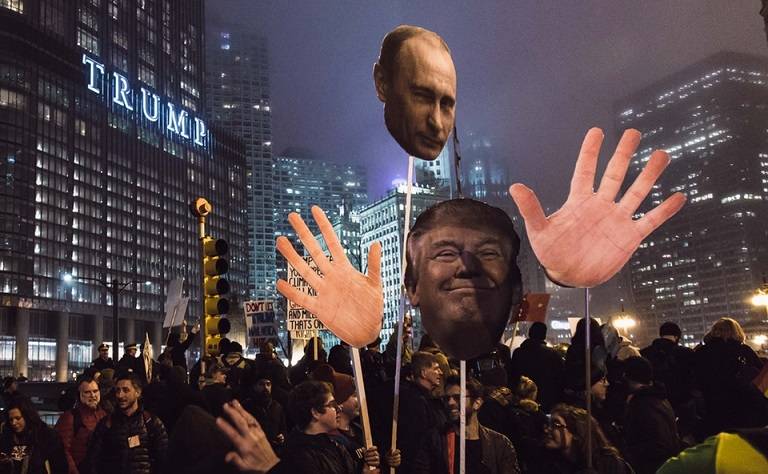The Affective Geopolitics of the New Cold War
15 May 2018
Alexander Lee (MSc Global Governance and Ethics) on a GGI Keynote Lecture with Professor Gerard Toal.

At the start of the 21st century, the age of bipolar great power politics appeared to be over. However, deteriorating relations between Russia and the West have left many of us to wonder if we are witnessing the emergence of a new Cold War.
Last month, Professor Gerard Toal from the School of Public and International Affairs at Virginia Tech, author of Near Abroad: Putin, the West and the Contest for Ukraine and the Caucasus, delivered a lecture on "The Affective Geopolitics of the New Cold War" at the UCL Global Governance Institute. This talk aimed to explain how the idea of a new Cold War emerged through affective formations and thin emotion-based explanations, what the consequences of this are, and what we can do about this.
Affective Geopolitics
Affective geopolitics, to quote Toal, is "the study of powerful forces of emotion, the experience of being outraged, the desire to condemn, to abhor the behaviour of another state". He is interested in the role of shock events in international affairs and how they disturb international "moral" order. These events can, and have, defined community, belonging and responsibility.
For example, 142 Russian diplomats were recently expelled by 27 countries, in response to the Skripal poisoning in the UK. This shock event has led to formations of two affective communities: those who are outraged and seeking to establish blame; and those who feel blamed and mobilize in response. The role of discourse and emotion has led to the perceived re-emergence of bipolarity within the international order, thereby establishing the notion of a new Cold War.
The New Cold War
The new Cold War rhetoric is part of the discourse of the Cold War itself. The term was used quite extensively during the years following the Soviet invasion of Afghanistan in 1979. In recent years, usage of the term has waxed and waned in response to geopolitical events as well as the 'discursive entrepreneurship' of certain individuals. For example, Toal referred to Edward Lucas' book The New Cold War which he described as a "polemic" against Putin and the practices of his regime. The book's release coincided with the shock event of the 2008 Russia-Georgia war over the South Ossetia and Abkhazia regions. Its second edition was released in March 2009, and the third edition was released in 2014, after the Russian invasion of Ukraine.
The events in Ukraine and the subsequent collapse of relations between Russia and the West led many analysts to argue that a new Cold War was upon us. Allegations of Russian cyber hacking interfering with the 2016 US presidential elections added to this as well. Western media, as a response, promoted content and material that emphasized the notion that we are experiencing a new Cold War. Notably, a video released by the Committee to Investigate Russia featured Morgan Freeman stating that "we are at war."
These shock events have affective power. They have produced and strengthened the new Cold War rhetoric. However, Toal highlighted that Europe is not currently divided into two heavily militarized alliance systems. There are divisions and armaments are increasing, but we are not witnessing the re-emergence of a bipolar international system or a battle of universal ideologies, i.e. communism and capitalism. Nevertheless, Toal argued that there is now a dangerous perception of a zero-sum struggle between Russia and the West, with each side deeply entrenched in its own sense of grievance.
Complications
Toal believes that, when discussing Russia and its relations with neighbouring nations, there is a drift towards a thin approach, i.e. one based on moral dichotomies. Such an approach is unable to capture the great complexities of Russia's relations with its near abroad. For example, while some states (e.g. Georgia, Ukraine) perceive Russia to be an invader, most of the contested break-away regions (South Ossetia, Abkhazia, Transnistria, etc.) in fact view Russia a protector.
Another issue that Toal addressed is the "geopolitical melodrama" between Russia and the US. Both sides believe they are protecting a group of peoples from an expansionist empire. The US extends its ideology of Cold War universalism, seeing itself as the defender of democracy and freedom and the protector of European nations under the umbrella of NATO. Russia, in turn, perceives NATO expansion as enabling anti-Russian fascist nationalism, the type of nationalism it fought during the "Great Patriotic War."
Regarding the 2014 MH17 crash, Toal described how conflicting narratives were delivered and perpetuated by different media. His own research has demonstrated a clear relationship between watching Russian television and believing that Ukraine was to blame for the downing of the plane. Despite being wary of the consequences of Russian information warfare, Toal also holds that we must pay attention to who is given the credentials as the decoder of this, as strongly biased political agendas can increase anti-Russian rhetoric rather than contributing to a productive understanding of current relations and affairs.
Toal also discussed how charges of Russian involvement in the US elections have made it convenient for many in the American political class to blame Russia and Putin for the election of Trump: "Trump has been Russified, Putin has been super-sized, and US political polarization…has been marginalized." The Democrats in particular now build upon the notion that Russia is a super-threat to the West, adding to the rhetoric of a new Cold War.
What Must be Done?
As many policy makers in the US have embraced a fierce anti-Russian rhetoric, Toal argued that - unhelpfully - the policy most likely to prevent an escalation of the new Cold War rhetoric currently belongs to Trump. Toal believes this is a "dangerous condition" as the results can be "escalatory", referring to the current events in Syria, where there was a real possibility of US attacks killing Russian soldiers, leading to a potential response.
Toal therefore emphasized that academic discussions of these shock events need to avoid thin emotional responses, based on geopolitical biases. Civil and constructive discussion is something, he believes, "we must do, if we are to avoid drifting towards… a calamitous conflict".
This talk should also inspire academics to study other conflicts in such a manner. We must be careful of falling victim to emotions, as public rhetoric of geopolitics can lead to a dangerous escalation of events.
 Close
Close


